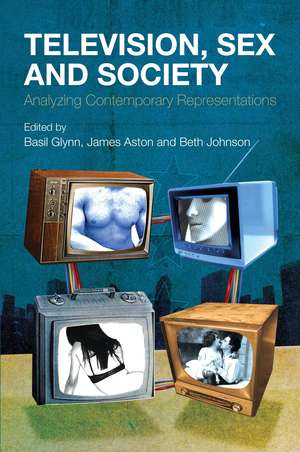Television, Sex and Society: Analyzing Contemporary Representations
Editat de Beth Johnson, James Aston, Dr Basil Glynnen Limba Engleză Paperback – 15 aug 2012
| Toate formatele și edițiile | Preț | Express |
|---|---|---|
| Paperback (1) | 237.75 lei 43-57 zile | |
| Bloomsbury Publishing – 15 aug 2012 | 237.75 lei 43-57 zile | |
| Hardback (1) | 714.51 lei 43-57 zile | |
| Bloomsbury Publishing – 15 aug 2012 | 714.51 lei 43-57 zile |
Preț: 237.75 lei
Preț vechi: 272.79 lei
-13% Nou
Puncte Express: 357
Preț estimativ în valută:
45.50€ • 47.21$ • 38.03£
45.50€ • 47.21$ • 38.03£
Carte tipărită la comandă
Livrare economică 17-31 martie
Preluare comenzi: 021 569.72.76
Specificații
ISBN-13: 9780826434982
ISBN-10: 0826434983
Pagini: 208
Dimensiuni: 150 x 226 x 15 mm
Greutate: 0.36 kg
Ediția:New.
Editura: Bloomsbury Publishing
Colecția Continuum
Locul publicării:New York, United States
ISBN-10: 0826434983
Pagini: 208
Dimensiuni: 150 x 226 x 15 mm
Greutate: 0.36 kg
Ediția:New.
Editura: Bloomsbury Publishing
Colecția Continuum
Locul publicării:New York, United States
Caracteristici
Discusses various techniques used by TV producers/programmers to establish the cultural worth of their texts
Notă biografică
Dr. James Aston is a lecturer in Film at the University of Hull. His PhD was on cinematic representations of the past and has published on post 9/11 apocalyptic cinema.
Dr Basil Glynn is a Lecturer in Film Studies in the Department of Media, Film & Communications, Liverpool Hope University.
Dr Basil Glynn is a Lecturer in Film Studies in the Department of Media, Film & Communications, Liverpool Hope University.
Cuprins
Introduction - by editors
Part I - The [move toward] Democratization of Sex?
Chapter 4: True Blood
Part II - The Sublimination of Sex
Chapter 5: Examining the Importance of 'no-sex' Sex in Pushing Daisies (2007-2009)
Chapter 6: My Lovely Sam-soon: Absent Sex and the Unbearable Lightness of Cute Korean Romance
Chapter 7: Television X-cised: Viewing Habits of British Adult Channels
Part III - Production Context and Representation of Sex
Chapter 8: 'I Cannot Talk of Books in a Ball-room': Erotic Austen
Chapter 9: Performance Anxiety and Period Dramas: Lesbian Sex on the BBC
Chapter 10: The Conquests of Henry VIII: Masculinity, Sex and the National Past in The Tudors
Conclusion - by the editors
Part I - The [move toward] Democratization of Sex?
Chapter 1: Sex on the 'Set': Pornographic Transgressions
Chapter 2: Shameless Sex, Democratizing Desire and Libidinous Ambitions
Chapter 3: FangbangingChapter 2: Shameless Sex, Democratizing Desire and Libidinous Ambitions
Chapter 4: True Blood
Part II - The Sublimination of Sex
Chapter 5: Examining the Importance of 'no-sex' Sex in Pushing Daisies (2007-2009)
Chapter 6: My Lovely Sam-soon: Absent Sex and the Unbearable Lightness of Cute Korean Romance
Chapter 7: Television X-cised: Viewing Habits of British Adult Channels
Part III - Production Context and Representation of Sex
Chapter 8: 'I Cannot Talk of Books in a Ball-room': Erotic Austen
Chapter 9: Performance Anxiety and Period Dramas: Lesbian Sex on the BBC
Chapter 10: The Conquests of Henry VIII: Masculinity, Sex and the National Past in The Tudors
Conclusion - by the editors
Recenzii
Television scholars have surely embraced the medium's engagement with sexuality, but Television, Sex and Society brings a much needed focus on the sex act (or lack thereof) itself. It deftly examines issues of production, reception, and text while breaking down the televised portrayal of sex through sensitive engagements with areas such as class (Channel 4's Shameless), nation and genre (BBC's Tipping the Velvet and South Korea's My Lovely Sam-Soon), sexualized power relations (British pornography and Buffy the Vampire Slayer), and abstinence (Pushing Daisies). It's surely a much welcome collection addressing an overlooked facet of today's highly sexualized television landscape. --Kelly Kessler, PhD, Assistant Professor of Media and Cinema Studies, DePaul University
In examining a selection of disparate texts, the book nevertheless usefully explores some of the institutional strategies and adopted modes of representation that allow, validate and exploit our voyeuristic fascination with sex on TV.
In examining a selection of disparate texts, the book nevertheless usefully explores some of the institutional strategies and adopted modes of representation that allow, validate and exploit our voyeuristic fascination with sex on TV.











